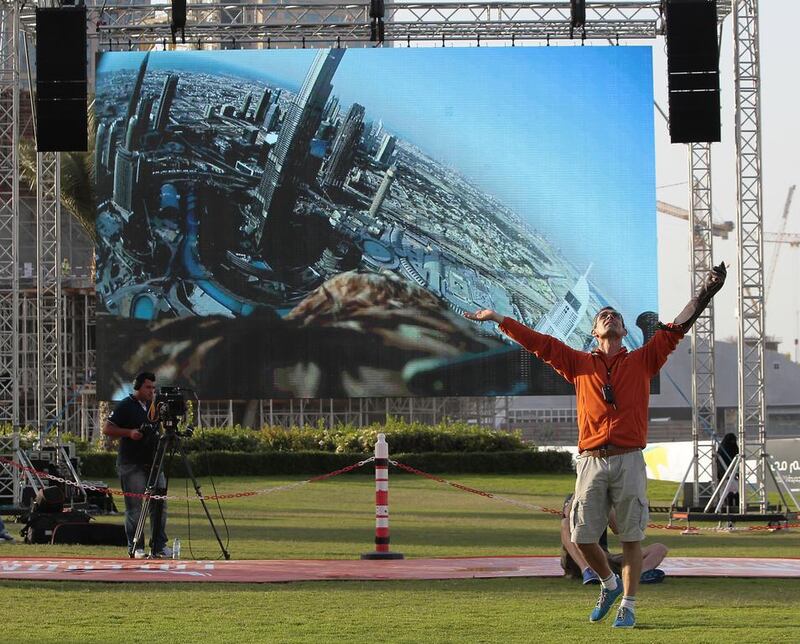DUBAI // As arrivals go, the landing of Darshan the rare white-tailed eagle at the base of the Burj Khalifa after taking off from its summit will be hard to beat.
Every second of the stunning flight from the world's highest man-made structure at 829.8 metres was recorded and streamed online across the globe in high-definition video from Sony's latest micro camera.
The crowds turned out to witness the historic spectacle as the flight set a new record for the highest launch of a bird from a man-made structure, beating the previous record from the Eiffel Tower in Paris.
Conservationists Freedom staged the stunt to draw attention to the plight of the endangered species across the world.
Once common across northern Europe, the white-tailed eagle had been hunted almost to extinction before breeding programmes - such as one run by Jacques-Olivier Travers in Thonon, France - helped to rescue the species.
The project was three years in the making, as Darshan had been trained to respond to a falconer's commands since birth in captivity.
With so many variables, much could go wrong on the day. But perfect weather, low wind and an obedient bird ensured that all went to plan.
"Darshan does not smell or hear very well, but he can see 10 times better than a human being," said Mr Travers.
"If I move one arm, he will see it. Most of the time it works, but it is a wild animal, so it is also unpredictable.
"The most difficult part was the first 250 metres. He had never been so high, so it was hard to know how he would react to my movements. After that it was OK."
Falconers scaled the exterior of the building and released Darshan from his transport cage from the summit.
After circling twice, and then gracefully gliding towards earth, at a command from Mr Travers Darshan entered a spectacular dive.
Red flags and a coloured square marked out the landing area, and Mr Travers wore a bright orange shirt to make him recognisable to Darshan, who landed perfectly on his arm.
"Many people here would not have seen a bird in flight like this before," said Mr Travers.
"His dive from about 300 metres was very impressive. Even in the mountains, it is hard to have this kind of drop.
"We wanted to show to the world how important it is to protect these beautiful birds."
The charity Freedom works in collaboration with Save our Species, a leading conservation initiative, and Unesco.
It aims to raise awareness about the plight of animals recorded on the IUCN red list of endangered species.
Freedom conservationist Ronald Menzel has been working on the Burj Khalifa project since December.
"It was a particular challenge, as planning in the Middle East for this kind of project is very difficult," he said.
"It went amazingly well and we could not have hoped for more. There was not much wind, just 15 knots or so, so it was perfect conditions.
"All the training for Darshan had paid off. He enjoyed flying and was not stressed in any way. He was very relaxed."
Over the past three decades, nature reserves and the introduction of several laws have been established to protect threatened animals.
The UAE has been active in the conservation of endangered animals by creating more than 15 natural reserves and rehabilitation programmes.
Freedom's eagles have flown from iconic landmarks across Europe, including St Paul's Cathedral in London.
Darshan's record-breaking flight was screened by the BBC on its World channel and also on the Sony YouTube channel.
Aboud Khederchah, who has been working on the Sony ActionCam Mini project, was delighted with the results of the flight and the quality of the video transmitted.
"The live transmission worked perfectly and the picture was very stable. We planned for 100 different scenarios but none of them arose so we were very lucky," he said.
nwebster@thenational.ae
Burj stunt to aid birds at risk
Rare white-tailed eagle swoops 830 metres from top of world's tallest building to trainer's arm in bid to raise awareness.

Editor's picks
More from the national





